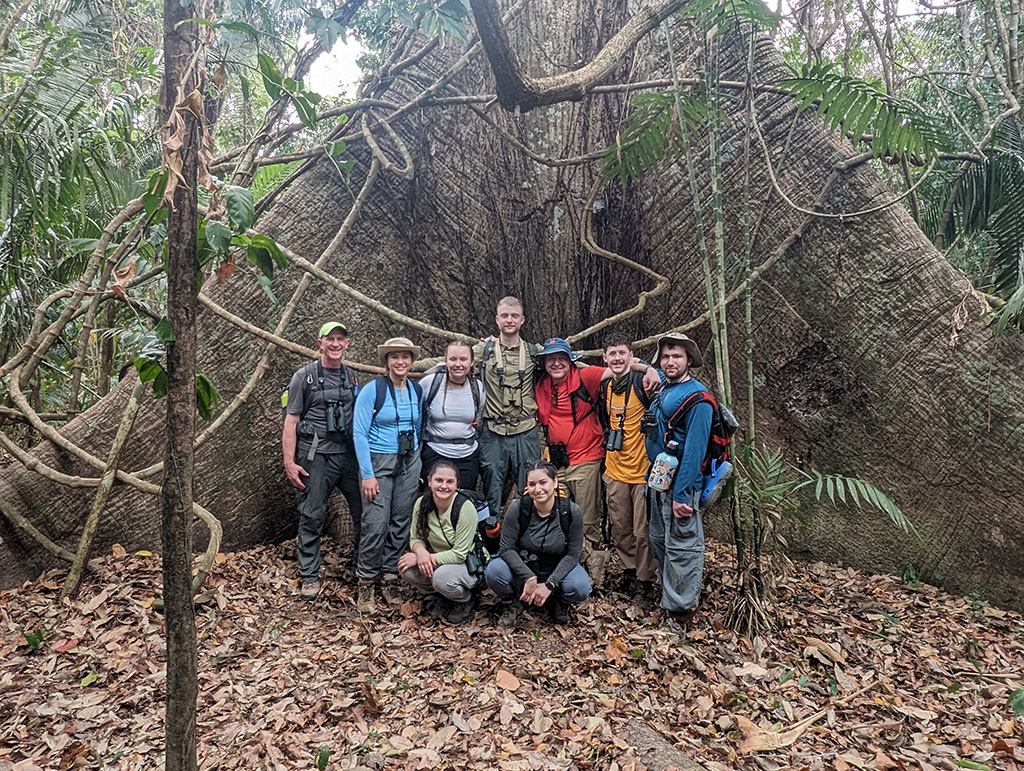Seven LU students live and learn in Belize
Seven Lakeland University students and two faculty recently returned from a unique study abroad course that saw them conduct research in the rainforest of Belize.
It’s the eighth time Lakeland has offered Tropical Ecology in Belize, which was created in 2008 by biology professors Paul Pickhardt and Greg Smith. Pickhardt led this trip with biochemistry professor Jered McGivern. Students on the trip included Andrea Garcia, Hunter Kuester, Gwynn Manteufel, Alexander Meer, Brandon Uhlean, Kassidee Webb and Montana Zdroik.
It was the second trip for Uhlean, the first Lakeland student to travel to Belize twice. He went on the last trip in 2022 and was inspired to return to the tropical ecosystems. He took the trip as a BIO 491 independent research course.
Belize is a tiny country, about the size of New Hampshire or Vermont, east of Guatemala on the eastern coast of Central America.
The centerpiece of the 15-day trip is nine days and eight nights at the Belize Foundation for Research & Environmental Education (BFREE), a private, protected area of 1,153 acres which adjoins what is now considered the largest tract of uninterrupted rainforest north of the Amazon.
It’s a hotspot for biodiversity where tapirs, howler monkeys, jaguars and various parrot species are often spotted, and is the last stronghold for many endangered species, including the rare harpy eagle.
BFREE, a nonprofit founded in 1995, strives to successfully integrate scientific research, environmental education, conservation and create sustainable development opportunities for alternative livelihoods for Belizeans.
Pickhardt noted that the region had not seen rain for five months and temperatures during the day got as high as 105-110 degrees. Previous classes needed to hike six miles into the BFREE area, but due to the lack of rain this group was able to drive the first four miles and walked the last two.
After spending part of the first day in the world’s first jaguar preserve, the group walked to BFREE in 95-degree heat to reach the lowland tropical rainforest where they would conduct their research. The trip also included two nights in a Mayan village, three days of coral reef explorations while staying on a barrier caye 15 miles off of the coast, and a visit to the national zoo.
While still housing myriad fish and invertebrate species, Pickhardt said that Belize’s barrier reef has degraded dramatically over the 16 years that Lakeland has offered the course due to climate change. The coral reefs of the world are all in serious decline, he said.
Here is an overview of the research conducted by the students:
“Assessing the Relationship Between Wolf Spider and Tarantula Abundance in the Belizean Rainforest” researched by Alexander Meer, Kassidee Webb and Montana Zdroik. This team researched the abundance of each species of spider and the density of each around the other. Most of their research was conducted at night.
Meer, a transfer student from Kiel, Wis., will be a senior in biology. Webb, from Texas, will be a junior majoring in chemistry/biochemistry and has worked at Lakeland as a lab tech. Zdroik, from Stevens Point, Wis., will be a junior majoring in chemistry/biochemistry with a psychology minor who aspires to go to medical school.
“Comparing the Abundance and Diversity of Land Snails Across Five Tree Species in a Lowland Tropical Rainforest” researched Gwynn Manteufel and Andrea Garcia. These students researched the abundance and diversity of land snails and the correlation between trees with resources and the abundance of snails.
Manteufel, from Kewaskum, Wis., will be a senior biology major who hopes to go on to professional school for animal science. Garcia graduated in May with a bachelor’s degree in biology and she was named LU’s Outstanding Student in Biology. She hopes to attend medical school and eventually practice as an ophthalmologist.
“Testing for the Effects of Insolation on Epiphyte Abundance and Diversity During the Dry Season at the Belize Foundation for Research & Environmental Education (BFREE)” researched by Hunter Kuester. He researched the amount of sunlight hitting the forest floor due to tree coverage and the abundance of plants growing on the sides of trees in different forest types.
Kuester, of Sheboygan, graduated in May with a bachelor’s in biology. A plant lover, he works as a land manager for Kohler Co. for part of their River Wildlife properties.
“Temporal Variability in Carbon Dioxide and Ethanol Emissions of Leafcutter Ant Nests in a Lowland Tropical Forest” researched Brandon Uhlean. He researched leafcutter ants and how they affect greenhouse gases which helped him understand the ant’s behavior and nest dynamics.
Uhlean, of Naperville, Ill., graduated in May with a bachelor’s in biology and a degree in food safety and quality. He will serve as a research internship/tech position in the Colorado mountains to work in forestry and eventually hopes to attend graduate school.
The Belize travel course, which receives generous funding from 1969 Lakeland graduate Cliff Feldmann, will next be offered in May of 2026.
